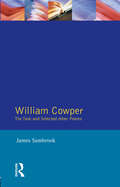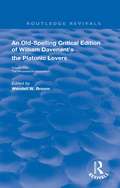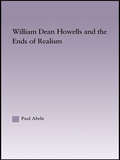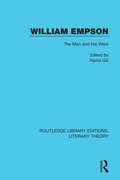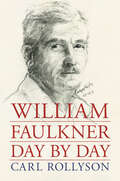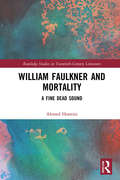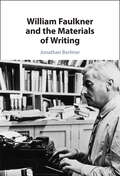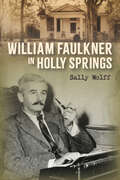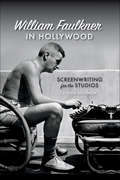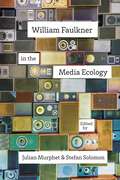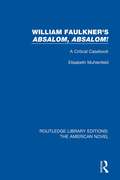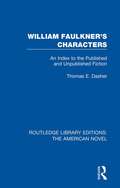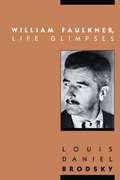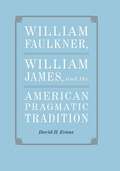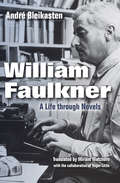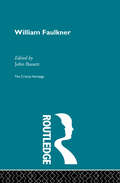- Table View
- List View
William Cowper: The Task and Selected Other Poems
by James SambrookHaving previously suffered neglect as a result of Pope's dominance of the period, William Cowper (1731-1800) has now become a far more important figure in eighteenth-century literature. Following the successful format of the series, Professor Sambrook's edition consists of a comprehensive, contextual editor's introduction together with substantial annotation on the page. The Task (1785) is the principal text discussed together with a selection of Cowper's other poems which cover a wide range of his subjects, moods and styles.
William Davenant’s The Platonic Lovers (Routledge Revivals)
by Wendell W. BroomFirst published in 1987, this 23rd volume in the Renaissance Imagination series had the objective of establishing the text of William Davenant’s The Platonick Lovers that most closely represents the author’s final vision for his work. Wendell W. Broom Jr documents the history of the publication of The Platonick Lovers and the manner in which the present text was produced. Copies of all relevant editions have been collated and curated to bring together the definitive authorial version of the text.
William Dean Howells and the Ends of Realism (Studies in Major Literary Authors)
by Paul AbelnDespite efforts at revival by John Updike and others, William Dean Howells still remains in the shadows of his close friends Mark Twain and Henry James. This book works against decades of unfavorable comparisons with these literary giants. William Dean Howells and the Ends of Realism helps us to see him as a writer very much aware of his limitations and of his enormous importance in the development of an American literary tradition. A close look at his late works gives us a richer understanding of this powerful moment of transition in American literature, a moment when Howells and his venerable friends were inspiring and anointing a new generation of writers and taking a long, hard look at their own legacies and contributions.
William Empson: The Man and His Work (Routledge Library Editions: Literary Theory #14)
by Roma GillThis volume of commemorative and celebratory essays, first published in 1974, concentrates on William Empson – the critic, the poet and friend. The papers range from the biographical to the academic, but what every one suggests is the impossibility of separating the man from his work and the ‘life’ from the ‘thought’. This book constitutes an important study of Empson, his work and his impact upon people and literary studies of our time.
William Faulkner (Comprehensive Research and Study Guide)
by Harold BloomCommentary on the author's major works and on his life.
William Faulkner Day by Day
by Carl RollysonWilliam Faulkner has been the topic of numerous biographies, papers, and international attention. Yet there are no collected resources providing a comprehensive scope of Faulkner’s life and work before now. William Faulkner Day by Day provides unique insight into the daily life of one of America’s favorite writers. Beyond biography, this book is an effort to recover the diurnal Faulkner, to write in the present tense about past events as if they are happening now. More importantly, this book is concerned with more than the writer’s life. Instead, it examines the whole man—the daily, mundane, profound, life changing, and everything in between. Spanning from the 1825 birth of Faulkner’s great-grandfather to Faulkner’s death 137 years later to the day, author and biographer Carl Rollyson presents for the first time a complete portrait of Faulkner’s life untethered from any one biographical or critical narrative. Presented as a chronology of events without comment, this book is accompanied by an extensive list of principal personages and is supported by extensive archival research and interviews. Populated by the characters of Faulkner’s life—including family and friends both little known and internationally famous—this book is for Faulkner readers of all kinds with a wide variety of interests in the man and his work.
William Faulkner and Mortality: A Fine Dead Sound (Routledge Studies in Twentieth-Century Literature)
by Ahmed HoneiniWilliam Faulkner and Mortality is the first full-length study of mortality in William Faulkner’s fiction. The book challenges earlier, influential scholarly considerations of death in Faulkner’s work that claimed that writing was his authorial method of ‘saying No to death’. Through close-readings of six key works – The Sound and the Fury, As I Lay Dying, "A Rose for Emily", Light in August, Absalom, Absalom!, and Go Down, Moses – this book examines how Faulkner’s characters confront various experiences of human mortality, including grief, bereavement, mourning, and violence. The trauma and ambivalence caused by these experiences ultimately compel these characters to ‘say Yes to death’. The book makes a clear distinction between Faulkner’s quest for literary immortality through writing and the desire for death exhibited by the principal characters in the works analysed. William Faulkner and Mortality: A Fine Dead Sound offers a new paradigm for reading Faulkner’s oeuvre, and adds an alternative voice to a debate within Faulkner scholarship long thought to have ended.
William Faulkner and Southern History
by Joel WilliamsonTraces Faulkner's ancestry and life, then relates this material to his writings.
William Faulkner and the Materials of Writing
by Jonathan BerlinerWilliam Faulkner and the Materials of Writing examines the many physical texts in Faulkner's novels and stories from letters and telegrams to Bibles, billboards, and even the alphabetic shape of airport runways. Current investigations in print culture, book history, and media studies often emphasize the controlling power of technological form; instead, this book demonstrates how media should be understood in the context of its use. Throughout Faulkner's oeuvre, various kinds of writing become central to characters forming a sense of the self as well as bonds of intimacy, while ideologies of race and gender connect to the body through the vehicle of writing. This book combines close reading analysis of Faulkner's fiction with the publication history of his works that together offer a case study about what it means to live in a world permeated by media.
William Faulkner in Context
by John T. MatthewsWilliam Faulkner in Context explores the environment that conditioned Faulkner's creative work. This book provides a broad and authoritative framework that will help readers to better understand this widely read yet challenging writer. Each essay offers a critical assessment of Faulkner's work as it relates to such topics as genre, reception, and the significance of place. Although Faulkner dwelt in his native Mississippi throughout his life, his visits to cities like New Orleans, Paris, and Hollywood profoundly shaped his early career. Inextricable from the dramatic upheavals of the twentieth century, Faulkner's writing was deeply affected by the Great War, the Great Depression, World War II, and the civil rights movement. In this volume, a host of renowned scholars shed light on this enigmatic writer and render him accessible to students and researchers alike.
William Faulkner in Holly Springs
by Sally WolffWilliam Faulkner in Holly Springs describes places and people in this small Mississippi town and defines how these newly identified individuals and locales affected Faulkner’s writings. Author Sally Wolff uncovers new information about Faulkner’s sources and examines how the town of Holly Springs, its people, and its culture influenced the Nobel Laureate and the literature he produced. Wolff argues that this information can serve as touchstone sources for some of Faulkner’s most renowned fiction, including The Sound and the Fury, Absalom, Absalom!, Intruder in the Dust, and Requiem for a Nun.Information from various interviews with over twenty current and former citizens of Holly Springs also helps to reveal Faulkner’s presence in this small town and the ways in which he drew from and then transformed what he found there into some of the greatest works in American letters. A clearer understanding of Faulkner’s sources helps elucidate the breadth of creativity and imagination with which he forged his world-famous literature.
William Faulkner in Hollywood: Screenwriting for the Studios (The South on Screen)
by Stefan SolomonA scholarly examination of the scripts and fiction Faulkner created during his foray as a Hollywood screenwriter. During more than two decades (1932-1954), William Faulkner worked on approximately fifty screenplays for major Hollywood studios and was credited on such classics as The Big Sleep and To Have and Have Not. Faulkner&’s film scripts—and later television scripts—constitute an extensive and, until now, thoroughly underexplored archival source. Stefan Solomon analyzes the majority of these scripts and also compares them to the fiction Faulkner was writing concurrently. His aim: to reconcile two aspects of a career that were not as distinct as they first might seem: Faulkner the screenwriter and Faulkner the modernist, Nobel Prize–winning author. As Solomon shows Faulkner adjusting to the idiosyncrasies of the screenwriting process (a craft he never favored or admired), he offers insights into Faulkner&’s compositional practice, thematic preoccupations, and understanding of both cinema and television. In the midst of this complex exchange of media and genres, much of Faulkner&’s fiction of the 1930s and 1940s was directly influenced by his protracted engagement with the film industry. Solomon helps us to see a corpus integrating two vastly different modes of writing and a restless author. Faulkner was never only the southern novelist or the West Coast &“hack writer&” but always both at once. Solomon&’s study shows that Faulkner&’s screenplays are crucial in any consideration of his far more esteemed fiction—and that the two forms of writing are more porous and intertwined than the author himself would have us believe. Here is a major American writer seen in a remarkably new way.
William Faulkner in the Media Ecology (Southern Literary Studies)
by Richard Godden Robert Jackson Julian Murphet John T. Matthews Mark Steven Stefan Solomon Sarah Gleeson-White Donald Kartiganer Catherine G. Kodat Peter Lurie Sascha Morrell Jay Watson Michael ZeitlinWilliam Faulkner in the Media Ecology explores the Nobel Prize-winning author immersed in the new media of his time. Intersecting with twentieth-century technology such as photography, film, and sound recording, these twelve essays portray Faulkner as not only as a writer looking back on the history of the U.S. South, but also as a screenwriter, aviator, and celebrity. This fresh, interdisciplinary approach to Faulkner presents an innovative way of reassessing a body of literary work that has engaged readers and critics for over sixty years. Essays by John T. Matthews, Catherine Gunther Kodat, Stefan Solomon, and Donald M. Kartiganer assess how Faulkner's legacy has been shaped through media adaptation and public commemoration of his work. Jay Watson, Michael Zeitlin, Sarah Gleeson-White, Robert Jackson, and Sascha Morrell consider a range of media relevant to the creation of the writer's stories and ways to recalibrate traditional thinking about his writing. Mark Steven, Peter Lurie, and Richard Godden examine how the vastly different mediations of both cinema and money influenced Faulkner's work. Editors Julian Murphet and Stefan Solomon have brought together some of the most prominent voices in Faulkner studies, along with a number of emerging scholars, to construct a portrait of Faulkner as a thoroughly modern writer, as much attuned to the evolution of the contemporary world as he was to the past.
William Faulkner of Yoknapatawpha County
by Lewis LearyOne of a series entitled Twentieth Century American Writers.
William Faulkner's 'Absalom, Absalom!: A Critical Casebook (Routledge Library Editions: The American Novel #13)
by Elisabeth MuhlenfeldOriginally published in 1984. William Faulkner is the most studied American author of our time. This volume presents a collection of some of the best critical essays on William Faulkner’s ninth novel Absalom, Absalom!. Numerous approaches are represented; among them are theme studies, close readings, psychological studies, source studies, structural studies, and analyses of style and narrative technique.
William Faulkner's Characters: An Index to the Published and Unpublished Fiction (Routledge Library Editions: The American Novel #5)
by Thomas E. DasherOriginally published in 1981. This index to characters and names in the published and unpublished fiction of William Faulkner is in two parts. The first, divided into novels, short stories, and unpublished fiction, lists the characters within each individual work. The second is an index of all named characters. Within each division of the first part of the index, works are listed alphabetically. The characters and names in each work are divided into fictional, unnamed, historical, Biblical and literary/mythic. The Master Index of named characters is a conflation of all the fictional characters as well as historical/Biblical/literary/mythic characters and names which appear in all the fiction. All characters are identified as clearly and succinctly as possible without interpretation of their roles.
William Faulkner's Gothic Domain
by Elizabeth M. KerrFrom the book: "The term "Gothic" unfortunately has pejorative connotations which we must recognize before giving it the comprehensive definition necessary to an examination of the pervasive Gothic elements in William Faulkner's Yoknapatawpha novels. In current literary criticism "Gothic" either refers in the historical sense to the Gothic novel as a subgenre, from Horace Walpole through his literary successors such as Ann Radcliffe, Matthew Gregory Lewis, and Charles Maturin, or is loosely applied to various aspects of serious modern novelists such as Faulkner and Carson McCullers."
William Faulkner's Light in August (Modern Critical Interpretations)
by Harold BloomEssays from various critics.
William Faulkner, American Writer: A Biography
by Frederick R. KarlFrom the book: "This book attempts to integrate the latest in biographical information with Faulkner's own large body of work in fiction and poetry. It will not replace Joseph Blotner's monumental two-volume biography of Faulkner, which is an altogether different kind of book. I have not attempted to duplicate the full range of details of Faulkner's life that Professor Blotner has so ably researched and presented; but I have used the materials of Faulkner's work as biographical data in ways Professor Blotner did not attempt or intend to do. By integrating life and work, I have tried to avoid a chronicle or linear life study, which in other circumstances has its own kind of value. This study is in the deepest sense a biography: not only a presentation of the relevant facts of the subject's life, but an effort to understand and interpret that life psychologically, emotionally, and literarily. It tries to put Faulkner together- if not entirely as an understandable man then as a man who may be understood as America's greatest novelist of the twentieth century."
William Faulkner, Life Glimpses
by Louis Daniel BrodskyDuring thirty years of literary collecting, Louis Daniel Brodsky has acquired some of the most important source materials on the life and work of William Faulkner anywhere available. Indeed, the Brodsky Collection, now owned by Southeast Missouri State University, has been characterized by Robert Penn Warren as "stupendous. " In William Faulkner, Life Glimpses, Brodsky mines this storehouse of previously unpublished material, using interviews, letters, speeches, movie scripts, and notes to enrich our understanding of this well-known Southern writer. The result is a highly readable biography that is thematic and episodic rather than chronological in its organization. Building on specific documents in the collection, Brodsky opens new windows on the parallel development of Faulkner's literary career and personal life. New material on the early poems ''Elder Watson in Heaven" and "Pregnancy" gives insight into Faulkner's developing literary and personal aesthetics during the 1920s and 1930s. Faulkner's metamorphosis from self-doubting, isolated artist to confident public spokesman during the 1940s and 1950s forms the central core of the study. Through previously unavailable screenplays written for Warner Bros. during World War II and an interview with Faulkner's fellow screenwriter Albert I. "Buzz" Bezzerides, Brodsky charts the decline in Faulkner's literary output and his corresponding discovery of a public voice. He shows how Faulkner's astonishingly positive 1950 Nobel Prize acceptance speech was not a sudden about-face from the bleak outlook that had produced The Sound and the Fury. Rather, Faulkner's years in Hollywood showed him that words, even screenplays, could shape the way people think and react. Faulkner's lifelong quest for a "manly" role ended, Brodsky declares, when he took up the mantle of public spokesmanship. In the final chapter, a revealing interview with Faulkner's granddaughter, Victoria Fielden Johnson, paints an insider's portrait of life at the Faulkner home, Rowan Oak. A copy of Faulkner's recipe for curing pork, included in the appendix, emphasizes his longterm struggle to produce fine literature while supplying the everyday needs of a large family. These and other materials, previously unavailable to scholars and the reading public, will broaden and enrich our understanding of one of America's most celebrated writers.
William Faulkner, William James, and the American Pragmatic Tradition (Southern Literary Studies)
by David H. EvansIn William Faulkner, William James, and the American Pragmatic Tradition, David H. Evans pairs the writings of America's most intellectually challenging modern novelist, William Faulkner, and the ideas of America's most revolutionary modern philosopher, William James. Though Faulkner was dubbed an idealist after World War II, Evans demonstrates that Faulkner's writing is deeply connected to the emergence of pragmatism as an intellectual doctrine and cultural force in the early twentieth century. Tracing pragmatism to its very roots, Evans examines the nineteenth-century confidence man of antebellum literature as the original practitioner of the pragmatic principle that a belief can give rise to its own objects. He casts this figure as the missing link between Faulkner and James, giving him new prominence in the prehistory of pragmatism. Moving on to Jamesian pragmatism, Evans contends that James's central innovation was his ability to define truth in narrative terms -- just as the confidence man did -- as something subjective and personal that continually shapes reality, rather than a set of static, unchanging facts.In subsequent chapters Evans offers detailed interpretations of three of Faulkner's most important novels, Absalom, Absalom!, Go Down, Moses, and The Hamlet, revealing that Faulkner, too, saw truth as fluid. By avoiding conclusion and finality, these three novels embody the pragmatic belief that life and the world are unstable and constantly evolving. Absalom, Absalom! stages a conflict of historical discourses that -- much like the pragmatic concept of truth -- can never be ultimately resolved. Evans shows us how Faulkner explores the conventional and arbitrary status of racial identity in Go Down, Moses, in a way that is strikingly similar to James's criticism of the concept of identity in general. Finally, Evans reads The Hamlet, a work that is often used to support the idea that Faulkner is opposed to modernity, as a depiction of a distinctly pragmatic and modern world.With its creative coupling of James's philosophy and Faulkner's art, Evans's lively, engaging book makes a bold contribution to Faulkner studies and studies of southern literature.
William Faulkner: A Life through Novels
by André Bleikasten&“Accessible . . . Engaging . . . May well be our fullest account to date of what Bleikasten calls Faulkner&’s &‘energy for life&’ and &‘will to write.&’&” —Theresa Towner, author of The Cambridge Introduction to William Faulkner Writing to American poet Malcolm Cowley in 1949, William Faulkner expressed his wish to be known only through his books—but his wish would not come true. He would go on to win the Nobel Prize for literature several months later, and when he died famous in 1962, his biographers immediately began to unveil and dissect the unhappy life of &“the little man from Mississippi.&” Despite the many works published about Faulkner, his life and career, it still remains a mystery how a poet of minor symbolist poems rooted in the history of the Deep South became one of the greatest novelists of the twentieth century. Here, renowned critic André Bleikasten revisits Faulkner&’s biography through the author&’s literary imagination. Weaving together correspondence and archival research with the graceful literary analysis for which he is known, Bleikasten presents a multi-strand account of Faulkner&’s life in writing. By carefully keeping both the biographical and imaginative lives in hand, Bleikasten teases out threads that carry the reader through the major events in Faulkner&’s life, emphasizing those circumstances that mattered most to his writing: the weight of his multi-generational family history in the South; the formation of his oppositional temperament provoked by a resistance to Southern bourgeois propriety; his creative and sexual restlessness and uncertainty; his lifelong struggle with finances and alcohol; his paradoxical escape to the bondages of Hollywood; and his final bent toward self-destruction. This is the story of the man who wrote timeless works and lived in and through his novels.
William Faulkner: An Annotated Bibliography Of Criticism Since 1988
by John BassettThis set comprises of 40 volumes covering nineteenth and twentieth century European and American authors. These volumes will be available as a complete set, mini boxed sets (by theme) or as individual volumes. This second set compliments the first 68 volume set of Critical Heritage published by Routledge in October 1995.
